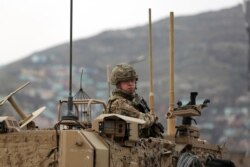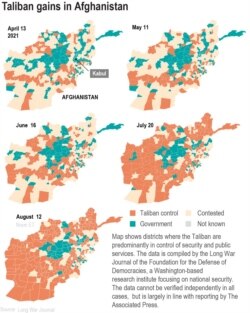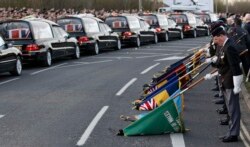British Defense Secretary Ben Wallace warned Friday that Afghanistan risks becoming a failed state and predicted a-Qaida will again thrive in the country.
“I’m absolutely worried that failed states are breeding grounds for those types of people,” he told British broadcaster Sky News.
Hours earlier Wallace announced Britain will dispatch hundreds of combat-ready paratroopers to Kabul to help evacuate more than 4,000 Britons and as many as 2,000 Afghans, who are likely to be killed by the Taliban for working with the British military.
The British redeployment will mean Britain will have the same number of troops in the country — 750 — before NATO forces started withdrawing last month from Afghanistan.
Officials also announced Thursday that the British Embassy is to move from the so-called Green Zone on the outskirts of the Afghan capital to what security chiefs think is a more secure undisclosed location. The embassy is to be reduced to a skeleton staff and that staff will focus largely on processing U.K. visas for Afghans earmarked for evacuation.
“The security of British nationals, British military personnel and former Afghan staff is our first priority. We must do everything we can to ensure their safety,” Wallace said Thursday as details of the deployment were announced. The evacuation force will be drawn mainly from the 16 Air Assault Brigade, the British army’s airborne rapid reaction force.
In a statement, Britain’s Defense Ministry said the deployment, which it said would take place in the next 48 hours, is being made “in light of the increasing violence and rapidly deteriorating security environment in the country.”
All British troops, though, are scheduled to depart Afghanistan by early September, in line with U.S. President Joe Biden’s deadline for the withdrawal of U.S. ground forces, a deadline also being observed by other NATO countries.
The speed of the Taliban’s military advance the past week has caught many British officials by surprise. It has also added to mounting criticism from British Conservative lawmakers and former senior British generals at the Biden administration’s decision to withdraw from Afghanistan.
“The decision to withdraw is like a rug pulled from under the feet of our partners,” Conservative Tom Tugendhat, chairman House of Commons Foreign Affairs Committee, wrote on Twitter.
He described the move as a “dismal failure of geo-strategy and of statecraft.”
“A hasty exit is not a sign of success. Needing reinforcements to keep the door open as you leave is a sure sign of failure,” he added.
Tugendhat, a former British army officer, served in Afghanistan. He was tweeting as the Taliban captured the city of Herat near the border with Iran as well as Kandahar, the Taliban’s spiritual home.
General Richard Dannatt, a former head of the British Army, also criticized the decision to withdraw from Afghanistan.
“I’m afraid Joe Biden has triggered this because while the much-reduced US-led NATO force was still in Afghanistan we were putting the backbone into the Afghan National Army and they were holding off the Taliban. Because he has decided to cut and run effectively it’s triggered this situation. It’s very sad,” he said.
U.S.-led NATO forces invaded Afghanistan nearly 20 years ago in the wake of the 9/11 terror attacks carried out by al-Qaida, whose leadership was harbored by Afghanistan’s then-Taliban government. A total of 456 British servicemen and Defense Ministry civilians have died in Afghanistan the past two decades.
Britain’s defense secretary was also critical of the withdrawal in his television interview Friday, saying, “This was not the right time or decision to make because, of course, al-Qaida will probably come back.” He noted he had disapproved publicly of the withdrawal deal between U.S. and the Taliban struck in 2020 by the administration of former U.S. President Donald Trump.
“I was public about it that at the time of the Trump deal. … I felt that that was a mistake to have done it that way, that we will all as an international community pay the consequences of that, but when the United States as the framework nation took that decision, the way we were all configured, the way we had gone in meant that we had to leave as well,” he said.
Biden Tuesday told reporters in Washington that he does not regret the withdrawal, despite the rapid advances being made by the Taliban.
Speaking to reporters at the White House, he said the U.S. was keeping the commitments it had made to the Afghan government by providing close air support to the Afghan military, paying army salaries and supplying Afghan forces with equipment.
“They've got to fight for themselves,” he said. “They've got to want to fight,” he added.











